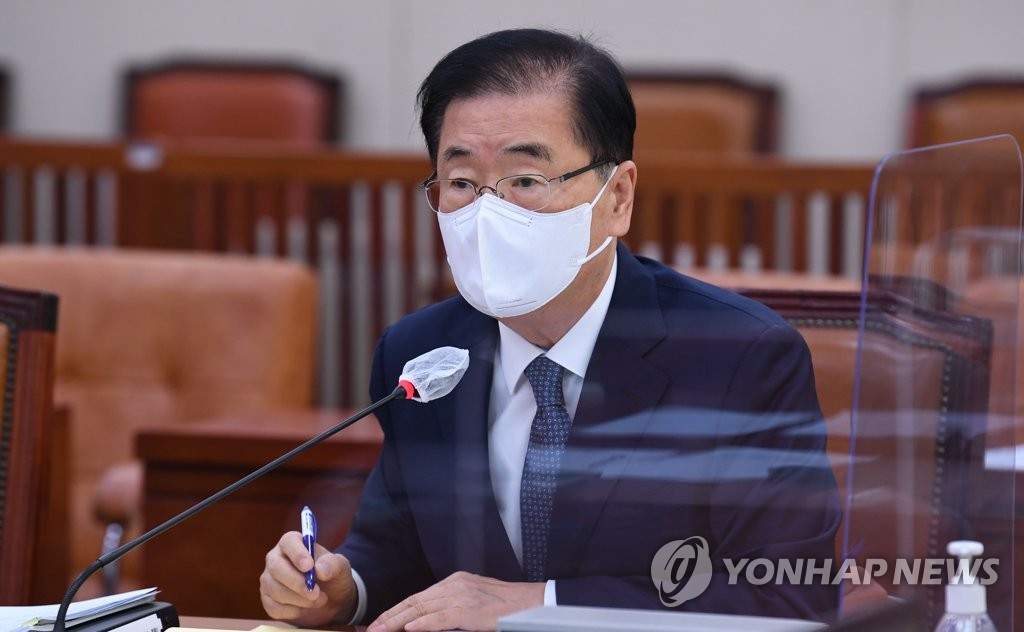- California Assembly OKs highest minimum wage in nation
- S. Korea unveils first graphic cigarette warnings
- US joins with South Korea, Japan in bid to deter North Korea
- LPGA golfer Chun In-gee finally back in action
- S. Korea won’t be top seed in final World Cup qualification round
- US men’s soccer misses 2nd straight Olympics
- US back on track in qualifying with 4-0 win over Guatemala
- High-intensity workout injuries spawn cottage industry
- CDC expands range of Zika mosquitoes into parts of Northeast
- Who knew? ‘The Walking Dead’ is helping families connect
FM Chung says N. Korea sanctions relief can be an option if it accepts dialogue offer
North Korea’s recent missile test underscores the need for engaging the reclusive state and sanctions relief can be considered as part of incentives to bring it back to the negotiating table, Seoul’s top diplomat said Wednesday.
Foreign Minister Chung Eui-yong was speaking at a parliamentary audit session, hours after the North said it has successfully test-fired a new type of submarine-launched ballistic missile (SLBM) on Tuesday.
“We should take some actions to prevent North Korea from further developing its nuclear and missile capabilities,” Chung said. “Sanctions relief can be considered as part of efforts, on condition that the North accepts the dialogue proposal.”
North Korea has faced worsening economic woes due to continued U.N. sanctions implemented in response to its nuclear and missile tests, as well as COVID-19 lockdowns and bad weather.
When asked whether Washington is on the same page with Seoul for the conditions-based easing of sanctions, Chung said, “The U.S. has consistently made it clear that it can discuss any issues at the negotiating table if the North returns to talks.”

Foreign Minister Chung Eui-yong speaks during a parliamentary audit session held at the National Assembly on Oct. 20, 2021. (Yonhap)
U.S. Special Representative for North Korea Policy Sung Kim on Tuesday reaffirmed that the U.S. remains open to dialogue with Pyongyang but made it clear that the Joe Biden administration will keep sanctions in place until the North makes concrete steps toward denuclearization.
Chung expressed hope that President Moon Jae-in’s proposal to formally end the 1950-53 Korean War could provide the much-needed momentum for the stalled denuclearization talks with Pyongyang.
“The end-of-war declaration is one of several options to restart the peace process. It aims to build trust to create an atmosphere for dialogue,” Chung said. “It is the first gateway for the peace process on the Korean Peninsula and an essential step.”
The North’s latest show of force came amid a flurry of diplomatic activities to resume the long-stalled denuclearization talks between Washington and Pyongyang.
The Moon Jae-in administration has been making last-ditch efforts for a breakthrough in the Korea peace process that lost steam with a no-deal Hanoi summit in 2019 between Kim and then U.S. President Donald Trump.
On Tuesday, U.S. Deputy Secretary of State Wendy Sherman said Washington has “directly” reached out to Pyongyang, reaffirming the Joe Biden government’s willingness to hold talks without preconditions.
“We have reached out directly to Pyongyang and stand ready to meet without preconditions, and as we have said publicly on multiple occasions, the United States does not harbour hostile intentions,” Sherman said in a virtual address to Korea Society’s annual gala held in New York.
She condemned the North’s latest missile test as “a violation of multiple UN Security Council resolutions.”
While the U.N. Security Council is set to hold an emergency closed-door meeting on North Korea’s SLBM test on Wednesday (New York time), Seoul’s foreign ministry said it has been closely communicating with the main council members to discuss the current situation on the Korean Peninsula and appropriate responses.
Regarding the stand-offs between Seoul and Tokyo, meanwhile, Chung said the government remains committed to efforts for mending bilateral ties in cooperation with the administration of new Prime Minister Fumio Kishida. The minister vowed to step up diplomatic consultations to seek “a realistic, reasonable solution” to protracted disputes over shared history, including wartime forced labor.
Japan imposed export curbs against the South in 2019 in retaliation for South Korean Supreme Court rulings that Japanese firms should pay compensation to forced labor victims.
Japan has claimed all reparation issues stemming from its 1910-45 colonization of Korea were settled under a 1965 treaty that normalized relations between the two countries, and urged the South to come up with acceptable solutions.











